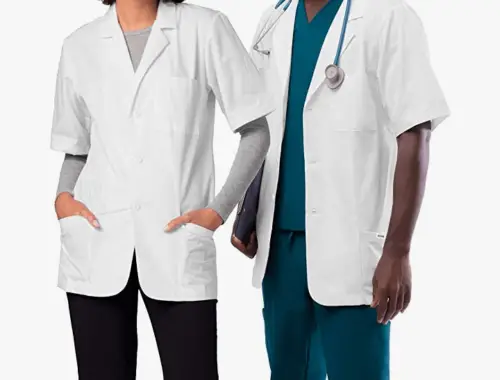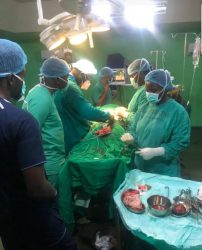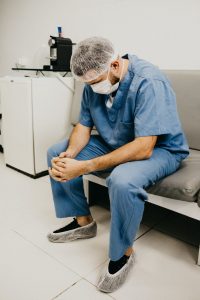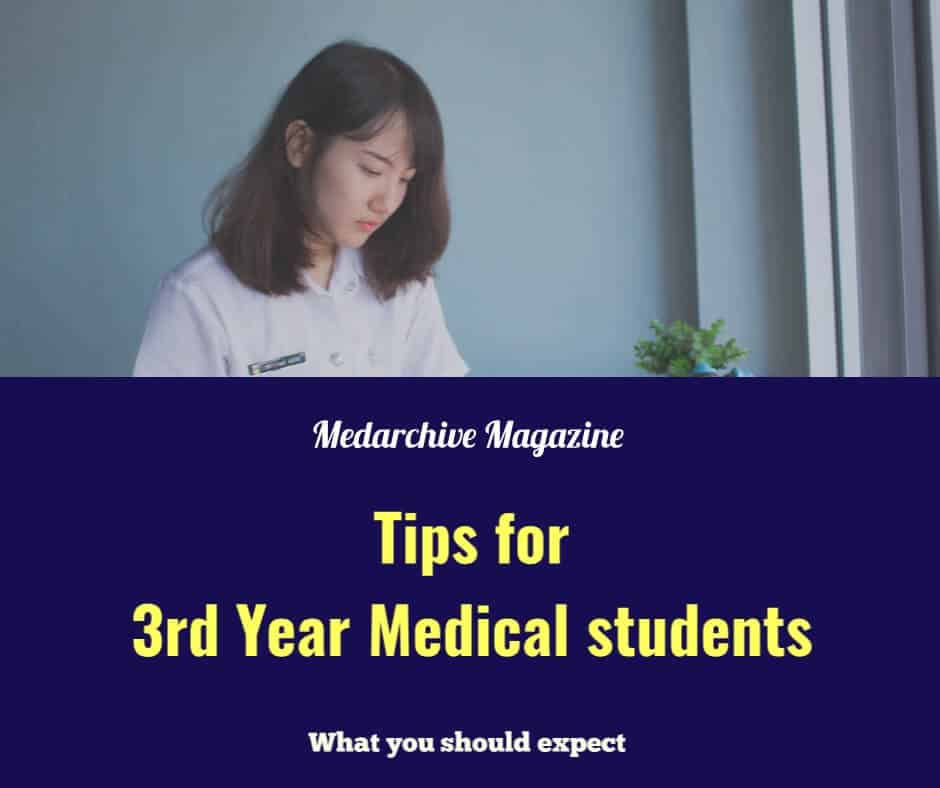As a 3rd year medical student, preparing your mind for the journey ahead can be stressful. This is because you have a lot of things to juggle with starting from your normal ‘block lectures’, the clinical rotations, and of course the professional exam following them all.
Don’t get me wrong! Every year of medical school has its own hassles and difficulties, but 3rd year medical school is one of the most challenging for some obvious reasons which you will find out in this post.
Table of Contents
- Who is a 3rd Year Medical Student?
- What a 3rd Year Medical Student Should Know
- How Do You Survive 3rd Year of Medical School?
- Attend your block lectures and make notes
- Final Words!
Who is a 3rd Year Medical Student?

In the US, a 3rd year medical student is a student of the Faculty of Medicine who has completed 1 year of the basic science courses, one year of the basic medical science courses, and has passed the USMLE Step 1 exam.
However, this is somewhat different from the MBBS programs for many other countries of the world. For instance;
A 3rd year medical student in a Nigerian medical school has only completed 1 year of the basic science courses (First year of medical school) and is currently preparing for the 1st medical professional exam (2nd MBBS).
However, for some medical schools in Nigeria, the later part of 3rd year in medical school marks the completion of the 2nd MBBS exam and introduction into the clinical rotations for medical students.
Just like in the United States, the beginning of the 3rd year of medical school also marks the introduction into the clinical rotations for medical students.
So the focus of this post will be for those 3rd year medical students in different medical schools who are just being introduced into the clinical classes and are also combining this with the block lectures and preparation for the 2nd medical professional exam; USMLE Step 2 for US students.
What a 3rd Year Medical Student Should Know

Being in 3rd year medical school means that you have successfully passed the ‘rate-limiting exam’ of medical school; the 1st medical professional exam. Many medical students in this phase usually have inflated self-esteem bearing in mind that it would be nearly impossible for them to fail out of medical school.
However, some medical students, tend to be overwhelmed with your exposure to a brand new model of learning introduced at this stage of medical school. You learn on your feet and by doing things, for the most part, contrary to your usual classroom learning.
Also, 3rd year is usually the most fast-paced of all medical school programs, and if you are not well-adapted enough to keep up with this speed, you will be left behind and struggle to meet up with the schedule when the professional exams draw near.
Whichever your own challenges are, there are certain things you must know in this phase of your medical school journey. Knowing these with a couple of advice I will be sharing will help you draft an excellent coping strategy to pass through this stage without any hassles.
Some important things you must note as a 3rd-year medical student:
- How long is 3rd year MBBS?
- What are the 3rd year MBBS subjects
- How to prepare for 3rd year medical school rotations
- How hard is 3rd MBBS?
- How to survive 3rd year medical school in general.
We will be discussing all the above in detail.
How Long is 3rd Year in MBBS
The 3rd year of medical school lasts between 10 months to 18 months in different schools. This includes a minimum of 6 months for block lectures and a minimum of 3 months for 3rd-year medical school rotations. That is a minimum of 9 months, making it the shortest program in most medical schools.
Depending on the medical school and the number of additional subjects in your curriculum, this can span longer than the normal 9 months and can go on for as long as 15 to 18 months.
However, in the US, the average is usually 12 months for most medical schools.
How many subjects are there in MBBS 3rd year?

There are 4 major subjects offered you will offer in your 3rd year as a medical student. Two of these subjects are core 3rd-year MBBS subjects, while the other two are in partial fulfillment for your final year medical school exam.
What Are the 3rd Year MBBS Subjects?
- Pathology
- Pharmacology
- Medicine
- Surgery
- Pathology: Human pathology deals with the study of the disease process going on in man. Remember that in your first and 2nd year of medical school, you learned the normal physiological functions of every cell of the human body from your anatomy, physiology and biochemistry. But now, you are now focusing on the deviation from the normal physiological function of man. That is the diseases going on in man. Human pathology has different sub-branches that are often treated indepently and they include;
- Histopathology: Which is the study of diseased body cells, tissues and how they affect the systemic functions.
- Microbiology: This is the study of the disease-causing micro-organisms
- Haematology: This is the study of blood and blood-related diseases.
- Chemical Pathology: This is the study of the biochemical functions of the body and the investigations with body fluids.
- Pharmacology: Pharmacology deals with the study of drugs and their use in the cure and management of diseases. It also have different sub-branches like:
- Pharmacokinetics and
- Pharmacodynamics
- Medicine: Medicine is the study of diseases and the application of this knowledge in the medical management of patients to improve health, prevent death and reduce disabilities. In 3rd year, medical students are inroduced only to the basics of medicine and clinical clerkship which include:
- The identification of signs and symptoms of different medical conditions
- How to obtain a detailed medical history of a patient’s illness.
- Common medical procedures you can learn en-passen during clinical postings and rotations through the different medical specialties.
- Surgery: Surgery is the study of diseases and the application of this knowledge in the surgical management of diseases to improve health, prevent death and reduce disabilities. This is also part of the courses you will do during your 3rd year medical schol rotations. Common things you should expect during surgical rotations inlcude:
- How to identify different surgical signs and symptoms in patients
- How to obtain a detailed surgical history of patient
- Common surgical procedures you observe in the theater during your rotations in the different surgical specialties.
However, for medical students in the United States who are in their 3rd year, they have completed their training in Pathology and Pharmacology and will be currently battling with Obstetrics/Gynecology and Pediatrics. So their clinical rotations will only be for these two courses.
Obstetrics is the field of study that is focused on pregnancy, childbirth, and the first 6 weeks after birth (the post-partum period). While Gynecology is the branch of medical practice that deals with the health of the female reproductive system.
Pediatrics is the study and management of diseases affecting children.
In some medical schools that have the facility, medical students also receive training on some subjects like;
- Forensic medicine and
- Medical psychology
How to prepare for 3rd year medical school rotations

We already have a guide for clinical rotations for every medical student which you should go ahead and read if you would like to make the best out of your clinical postings.
Clinical rotations are that phase of medical school where a medical student is posted under a consultant, resident doctors, and other senior doctors for the purpose of acquiring skills that is relevant to their level in school.
Below are important things you should note while preparing for your clinical rotations:
- You should get all the medical school essentials you need for your rotations. Most especially is the perfect lab coat design for students.
- Always show up on time to impress your seniors and consultants. Remember that they will help you write your reference letter. But most of all, there is a lot you can achieve during the early hours in clinic.
- Know your role and don’t go below or above that except when necessary.
- Take patient’s history as often as possible to sharpen your clinical skills.
- Respect everyone and be organized.
- Always dress well to clinics and wards.
- Ask questions. That’s the only way you can learn from those consultants.
- Get the relevant clinical apps for medical students.
For more information on how to succeed during your clinical posting, check out our guide for clinical rotations.
Is 3rd Year Medical School Hard?

3rd year medical school is what you make of it. It can be hard if you jump into it without the right guidance or without knowing what to expect. But it can be stress-free if you follow the right advice.
By my 3rd year of medical school, I have already had mentors from the older classes, and had connected with my academic adviser; a professor in the faculty of Obstetrics/Gynecology. These people helped me bring actionable solutions to the table whenever I was confused about what to do during my clinical rotations and my exams.
With their help, I was able to pass through my 3rd year without much stress.
How Do You Survive 3rd Year of Medical School?
Having survived 3rd year, and being currently in my final year of medical school, I am confident enough to be able to write a survival guide for 3rd year medical students. And honestly, if you follow the above principles which I will lay down below, you will do better than just survive 3rd year in any medical school you find yourself in.
7 tips to survive 3rd year of medical school:
- First get a time table
- Start studying on time
- Don’t miss a day of your clinical rotations
- Get all the essentials you need for 3rd year
- Do not joke with practicals
- Attend your block lectures and make notes
- Use your medical school textbooks as study guide
First, get a timetable
A timetable will help you to plan and organize your life especially if you are that medic that also engages in other extra-curricular activities. Some people often ask me how I am able to manage my blog and provide content on a regular basis while still coping well with my medical school life. But there is no secret except that I love making lists of what I want to achieve daily and following them up till completion.
You too can get a master timetable so that even before you wake up from sleep, you already know what you are supposed to be doing for the day.
Start studying on time
There is no big deal here. By now you should have known that the medical school subjects and textbooks are too many and bulky. So if you do not start studying them on time, how do you intend to cover up and pass your medical school exams?
Don’t miss a day of your clinical rotations
You must have seen that meme of a patient presenting to the clinic of a recently graduated doctor with a very weird illness only for the doctor to say;
"Oh sorry this illness is in that chapter of my medical textbook which I skipped"
This is similar to what happens during clinical rotations; for every day of clinical posting you miss, you miss out on an important lesson, skill, or weird illness that you may use to build your reputation in the future as a doctor.
Get all the essentials you need for 3rd year
The medical essentials here are those things you need during your studies and your clinical postings. They include your lab coat, medical instruments, and comfortable reading materials.
Do not joke with practicals
Just like your clinical rotations, your pathology and pharmacology practical sessions are also very important that you take them seriously. Be there on time and participate in the group work and make contributions.
Attend your block lectures and make notes
The block lectures are all those lectures you attend before you start your clinical rotations. These lectures are kind of telling you what to expect at every phase of your rotations and you need to attend them and make notes too. They could be your major saviors during exams.
Use your medical school textbooks as a study guide
I belong to that team of medical students that detest reading textbooks. Not because they are not interesting, but because they are just too bulky to be able to finish all important topics before the exam. Another reason is that I am a very slow reader. So I take more time to read and comprehend things compared to some of my colleagues that are fast readers.
However, there are just certain topics in medical school that require that you read them with a standard medical textbook to be able to comprehend what it’s all about. So I read such topics using the textbooks and then focus on the lecture notes for the rest.
If you are like me, then this will definitely help.
Final Words!
The 3rd year of medical school is usually fast-paced and if you do not take extra care, you might be left behind. However, if you get adapted quickly and move with their speed, you will be able to pass through the whole stress in no time and pass with your mates.
As a 3rd year medical student, the most important take-home from all these lists of advice is to start studying on time. This way you will be able to cope with any pressure associated with your USMLE Step 2 exam or your 2nd medical professional exam.
I wish you the best ride through his phase of your medical school journey! If you know someone whom this post will help, why not share it?
You May Also, Like:




